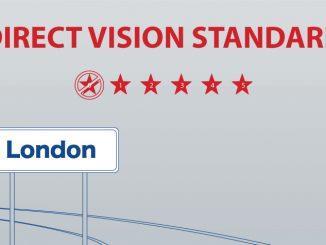
London’s Direct Vision Standard (DVS) and stricter enforcement of the Low Emission Zone (LEZ) have been postponed until February next year.
Mayor Sadiq Khan said the four-month delay would allow the freight industry to focus on its core operations during the COVID-19 pandemic.
Transport for London (TfL) has already suspended the current LEZ, the congestion charge and Ultra Low Emission Zone until further notice and this latest development comes after it became apparent that disrupted supply chains would have made it difficult for hauliers to meet the new standards on time.
The DVS was due to come into force on 26 October and TfL said it will reduce danger for all road users by introducing a permit system for HGVs and assigning them a star rating based on how much a driver can see through their cab window.
At the same time, heavier vehicles not meeting new stricter emissions standards would have had to pay a daily charge to enter the Capital’s LEZ.
The new date for the start of enforcement is to be kept under review.
Read more
- TfL “considering postponement” of Direct Vision Standard
- COVID-19: FTA requests extension to transition period for leaving EU and suspension of clean air zones and Direct Vision Standard
- TfL urges operators to apply for HGV safety permit by 26 October to comply with new Direct Vision Standard
Christina Calderato, TfL's head of transport strategy and planning, said: “The tighter standards for the Low Emission Zone and Direct Vision Standard are both absolutely vital to our plans to make London a cleaner, greener and safer place to live.
“We’re committed to bringing these changes in as soon as practically possible while supporting the freight industry and recognising that the coronavirus pandemic has placed intense new demands on people and organisations across the capital.”
The FTA said that amid the pandemic, there was simply no time or funding for businesses to have undertaken the work to prepare fleets for the DVS and the tightening of the LEZ.
Natalie Chapman, FTA head of urban policy said the delay would come as a welcome relief:
“Achieving compliance with the DVS will require many goods vehicles over 12 tonnes to have additional cameras, sensors and alarms fitted,” she said.
“However, supplies of technology, equipment and trucks are already being disrupted and more effects are expected.
“Delaying enforcement will allow businesses to focus their efforts on ensuring the population of London continues to receive the food, hygiene products and other basic items required to see them through this pandemic.”
Added BVRLA chief executive Gerry Keaney: "This will provide welcome relief to a freight industry that is focused on COVID-19 - keeping supply chains moving and surviving the economic impacts of the lockdown.
"The Mayor must continue to liaise with the sector and be ready to delay these schemes still further depending on how the sector and the wider economy are able to recover from the current crisis.”













